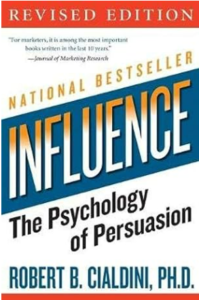Reading Notes For:


Part 5: Even before Social Media, it’s always been about Likeability
This is a summary of my reading notes from Influence by Robert Cialdini.
In this session, we delve even deeper into the intricate web of human persuasion and explore a captivating aspect of this phenomenon – the association principle. While many individuals aim to bolster their visible connections with successful people, some employ a different approach. They actively seek to enhance the perceived success of others they are closely associated with. This intriguing dynamic is exemplified by the notorious “stage mother,” who becomes singularly fixated on securing stardom for her child. Furthermore, it’s interesting to note that this phenomenon extends beyond the entertainment world; it can also be observed in various other domains, such as the medical field.
In the realm of healthcare, the spouses of physicians often find themselves under a unique set of pressures. They are compelled to seek personal prestige by aligning themselves with the professional stature of their doctor husbands. This phenomenon has been documented by John Pekkanen, the author of the acclaimed book “The Best Doctors in the U.S.” Pekkanen revealed that numerous protests regarding his list of top doctors didn’t originate from the physicians themselves but rather from their wives. This sheds light on the profound influence of the association principle, wherein individuals feel an innate need to establish connections with perceived success, even if it is through indirect means, such as their spouse’s professional accomplishments.
Now, let’s shift our focus to a pivotal aspect of the association principle – how to safeguard ourselves against its potent influence. Several factors that contribute to liking, including physical attractiveness, familiarity, and association, operate at an unconscious level, making them challenging to identify and counteract in real-time interactions.
Rather than attempting the arduous task of suppressing these underlying factors, we can concentrate on recognizing their effects, specifically the sensation that we have developed a stronger liking for someone than we initially anticipated. Once we discern this feeling, it serves as an invaluable signal that some form of persuasive tactic may be at play, prompting us to take essential countermeasures.
Crucially, we don’t need to comprehend the precise reasons behind our newfound liking; the mere awareness of its existence should trigger a response. One possible reaction might be to reverse our feelings and cultivate a sense of disliking the person. However, this approach might be unjust and counterproductive, especially if the individual is genuinely likable. Instead, I propose an alternative response.
When we acknowledge that we have developed an unwarranted liking for a compliance practitioner, it serves as a clear indicator that it’s time for a rapid counter maneuver. We should actively separate the person from the product or service they are promoting in our minds. By doing so, we can ensure that our decisions are founded solely on the merits and attributes of the offer, rather than being unduly swayed by the influence of liking.
In essence, it is of paramount importance to remain vigilant and attuned to our own emotional responses, particularly the feeling of unwarranted liking for a compliance practitioner. This recognition can serve as a powerful reminder to dissociate the person from the product or service, enabling us to make choices grounded in rational evaluation rather than being unduly influenced by the liking rule.
As you navigate the intricate terrain of persuasion, I encourage you to sharpen your awareness of your own reactions and emotions. By doing so, you can become more adept at recognizing and mitigating the effects of the association principle. This heightened awareness will empower you to make more informed and rational decisions across a spectrum of situations, ultimately enhancing your ability to navigate the complex world of persuasion effectively. Thank you for your unwavering attention, and I trust that this knowledge will prove invaluable in your future interactions and decision-making endeavors.
